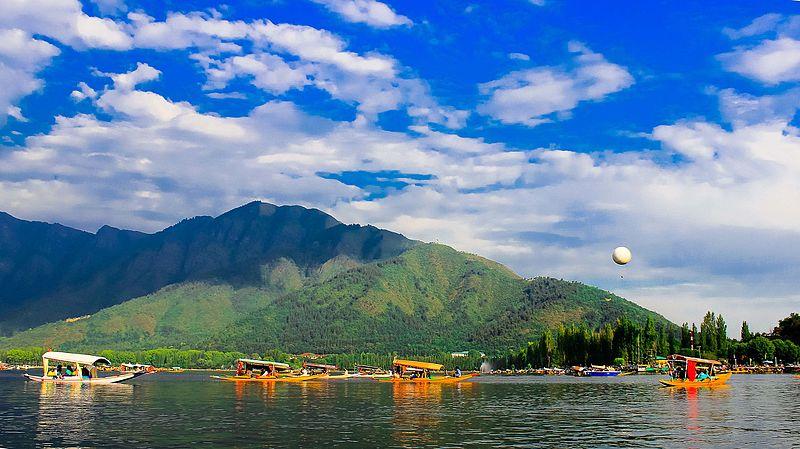Kashmir: Why Amit Shah’s ‘Development’ Argument is a Hoax

Image Courtesy: Wikimedia Commons
In justification of the move to end Kashmir’s special status, Amit Shah in his speech in the Rajya Sabha brought in the question of Kashmir’s “development”, arguing that closer integration with the rest of India will bring in much investment into the region. He especially appealed to the youth of Kashmir, promising that they would have larger employment opportunities.
When unemployment in India has never been as bad as now in the last 45 years, to claim that closer integration with India will improve Kashmir’s employment prospects, is ironical. But let us look at the argument closely.
Special status or no special status, the idea that large-scale industry, unrelated to processing any local raw materials, will flow into Kashmir is ridiculous in the extreme (though Shah did mention large-scale industry). The transport costs associated with locating a plant in Kashmir will be prohibitive; and with the repeal of Article 35A that restricts land purchase by “outsiders”, the land cost will soar, a point mentioned by Shah himself as a prospective “positive development”. So, the idea of somebody locating footloose large-scale industry in the Kashmir valley is just absurd. And much the same holds for footloose small-scale industry.
The only activities that can flourish in the valley, therefore, are those which use local materials, whether it is wool, or fruits, or wood, or meat. Such activities are already quite well-established in the Valley; they need energetic promotion, but that requires a sympathetic government in the state, not an end to special status, nor any abrogation of restrictions on land purchase by outsiders.
It may, of course, be thought that greater openness to the rest of the country will bring in multinational corporations or Indian big business to develop these very activities and thereby give a fillip to the valley’s economy. But big capital, whether Indian or foreign, engaged in the same activities in which local small producers are engaged, does not add to employment; if anything, it may lead to a contraction in employment through displacing local producers. And as for the increase in such activities over time, if there is scope for any such increase, it could as well be exploited by local producers themselves aided by state government agencies. Hence the time-profile of employment with big capital being drawn to local products, would, if anything, be lower than that with local producers; it will certainly never be higher.
But the real “hope” lies according to Shah in the entry of outsiders to purchase land in the Kashmir valley. It is incredible that while restrictions on outsiders’ purchase of land exist in Himachal Pradesh and other frontier hill states, only Kashmir is being asked to remove them in the name of “development”. But will a land boom cause development in the Kashmir valley?
When a person purchases land, he moves from holding some other asset to holding land; and for the seller it is the opposite. The question is, which other asset? If the buyers of land move from holding productive assets to holding land in the Kashmir valley, then of course that is a cause for retrogression in the rest of India. But let us assume that this is not the case, and take a scenario favourable to Amit Shah: the buyers move from cash to land, which does not prima facie cause any reduction in investment in the rest of India. In fact, let us take the case where they borrow money from the banking system, which is assumed not to be supply-constrained in providing credit, to buy land in the valley.
Now the question is: what do the sellers of land do with the money they get? For reasons just discussed, they are unlikely to invest in the Valley, except possibly in expanding production of local products. But there is absolutely no reason to believe that investment in the production of local goods has been constrained by any lack of finance. There may be scope for a substantial expansion of such production, but this would require energetic state government intervention; so simply having cash through the sale of land will not lead to any investment in increasing production (otherwise investment would have increased already even without any land sale). This cash, therefore, will, most likely, be deposited in the banks.
When such cash gets deposited in banks, it will almost certainly never be lent locally. Either it will be drawn out of Kashmir for lending in rest of the country, or at the most remain dormant locally with the banks. It follows, therefore, that the only change that would be likely to have occurred is the loss of land in the valley to outsiders against cash that also drains out of the valley, though now owned by some valley residents. There is not an iota of “development” or increase in employment caused by it.
On the other hand, however, to the extent that the land so changing hands, was being used for some activity before, that activity would stop because of its changing hands, with no other activity replacing it, since the outside buyers would be more interested in land price speculation or in having a summer retreat for themselves in the valley. This would cause a reduction in employment through a shrinking of activity in the valley.
Thus whichever way we look at it, the removal of special status and of restrictions on land purchase by outsiders will not add an iota of employment; on the contrary, it will most likely cause a reduction in employment in the Valley, even as land passes into the hands of rich outsiders from Delhi or Mumbai.
Indeed, if it was so obvious that removal of special status would improve the development prospects of the state, then the central government would not have found it necessary to imprison the political leaders of the state, including two former chief ministers, while ending special status. And since ending the special status will inevitably be followed by an increase in the level of violence in the state, even the tourist industry, which is the state’s staple activity, will get crippled forever, making the employment prospects of the Kashmiri youth even bleaker.
The slogan of “development”, in short, is a red herring. Why then has the central government done what it has? The common answer is that it has been a long-standing demand of the Hindutva elements, with an eye no doubt on altering the demographic composition of the only Muslim-majority state in the country, rather like Israel is doing on Palestinian lands.
While this would be true, we must not lose sight of its other possible objective. In fact, this government being the product of a Hindutva-corporate alliance, almost everything it does also caters to a pro-corporate agenda, apart from promoting Hindutva. Opening up the Kashmir Valley to its corporate patrons, not so much for expanding the volume of productive economic activities but for land acquisition for real estate development or for sheer speculation on land price, is also an added incentive. Such real estate development adds little to the level of employment; but it subtracts employment if the land was being used for some productive activities before.
Thus, quite apart from its damaging ecological consequences which are obvious and need no elaboration, opening up the Valley to a bunch of land speculators and real estate developers, will change the face of Kashmir for the worse forever, precisely because of its beauty. An economy engaged in a set of productive activities will be turned into a happy hunting ground for speculators and land-sharks, together with an upsurge in crime that such land speculation inevitably brings. This upsurge in crime will be over and above the upsurge in terrorism that doing away with the special status will inevitably generate. In fact, the two upsurges will feed on one another, rather like drugs and terrorism feeding on one another in other contexts.
It is a sad fate indeed for the state that had led the country in implementing anti-feudal land reforms. But Amit Shah no doubt would call this fate “development”.
Get the latest reports & analysis with people's perspective on Protests, movements & deep analytical videos, discussions of the current affairs in your Telegram app. Subscribe to NewsClick's Telegram channel & get Real-Time updates on stories, as they get published on our website.
























